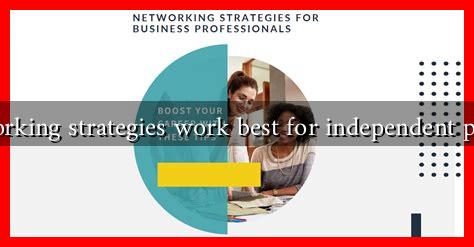-
Table of Contents
- What Networking Strategies Work Best for Independent Professionals
- The Importance of Networking for Independent Professionals
- Effective Networking Strategies
- 1. Leverage Social Media
- 2. Attend Industry Events and Conferences
- 3. Utilize Online Networking Platforms
- 4. Build a Personal Brand
- Conclusion
What Networking Strategies Work Best for Independent Professionals
In today’s competitive landscape, independent professionals—freelancers, consultants, and entrepreneurs—must leverage effective networking strategies to thrive. Networking is not just about exchanging business cards; it’s about building meaningful relationships that can lead to opportunities, collaborations, and growth. This article explores the most effective networking strategies for independent professionals, supported by examples and statistics.
The Importance of Networking for Independent Professionals
Networking is crucial for independent professionals for several reasons:
- Access to Opportunities: Many job openings and projects are filled through referrals rather than traditional job postings.
- Building Credibility: A strong network can enhance your reputation and establish you as an expert in your field.
- Collaboration and Partnerships: Networking can lead to partnerships that can expand your service offerings and client base.
According to a survey by LinkedIn, 85% of jobs are filled through networking, highlighting its significance in career advancement.
Effective Networking Strategies
1. Leverage Social Media
Social media platforms, particularly LinkedIn, are invaluable for independent professionals. Here’s how to use them effectively:
- Optimize Your Profile: Ensure your LinkedIn profile is complete, showcasing your skills, experiences, and recommendations.
- Engage with Content: Share relevant articles, comment on posts, and participate in discussions to increase visibility.
- Join Groups: Participate in industry-specific groups to connect with like-minded professionals and potential clients.
For instance, a freelance graphic designer might join design groups on LinkedIn to share their work and connect with potential clients.
2. Attend Industry Events and Conferences
In-person networking remains a powerful tool. Attending industry events allows for face-to-face interactions that can lead to lasting relationships. Here are some tips:
- Prepare Your Elevator Pitch: Have a concise introduction ready that highlights who you are and what you do.
- Follow Up: After meeting someone, send a personalized follow-up message to reinforce the connection.
- Be Authentic: Focus on building genuine relationships rather than just selling your services.
For example, a consultant attending a marketing conference can network with potential clients and collaborators, leading to new projects.
3. Utilize Online Networking Platforms
Platforms like Meetup, Eventbrite, and even specialized forums can help independent professionals connect with others in their field. Consider the following:
- Join Relevant Meetups: Look for local meetups related to your industry to meet peers and potential clients.
- Participate in Webinars: Engage in online webinars and Q&A sessions to showcase your expertise.
- Network in Niche Communities: Platforms like Reddit or industry-specific forums can provide valuable connections.
For instance, a software developer might join a coding meetup to network with other developers and potential clients.
4. Build a Personal Brand
Establishing a strong personal brand can significantly enhance your networking efforts. Here’s how:
- Create a Professional Website: Showcase your portfolio, testimonials, and services on a personal website.
- Blog or Vlog: Share your insights and expertise through blogging or vlogging to attract an audience.
- Engage in Public Speaking: Offer to speak at events or webinars to position yourself as an industry expert.
A freelance writer, for example, might start a blog about writing tips, attracting clients who appreciate their expertise.
Conclusion
Networking is an essential skill for independent professionals looking to grow their businesses and careers. By leveraging social media, attending industry events, utilizing online platforms, and building a personal brand, independent professionals can create meaningful connections that lead to new opportunities. Remember, effective networking is about building relationships, not just collecting contacts. As you implement these strategies, focus on authenticity and value, and you will see the benefits in your professional journey.
For more insights on networking strategies, consider visiting Forbes.

